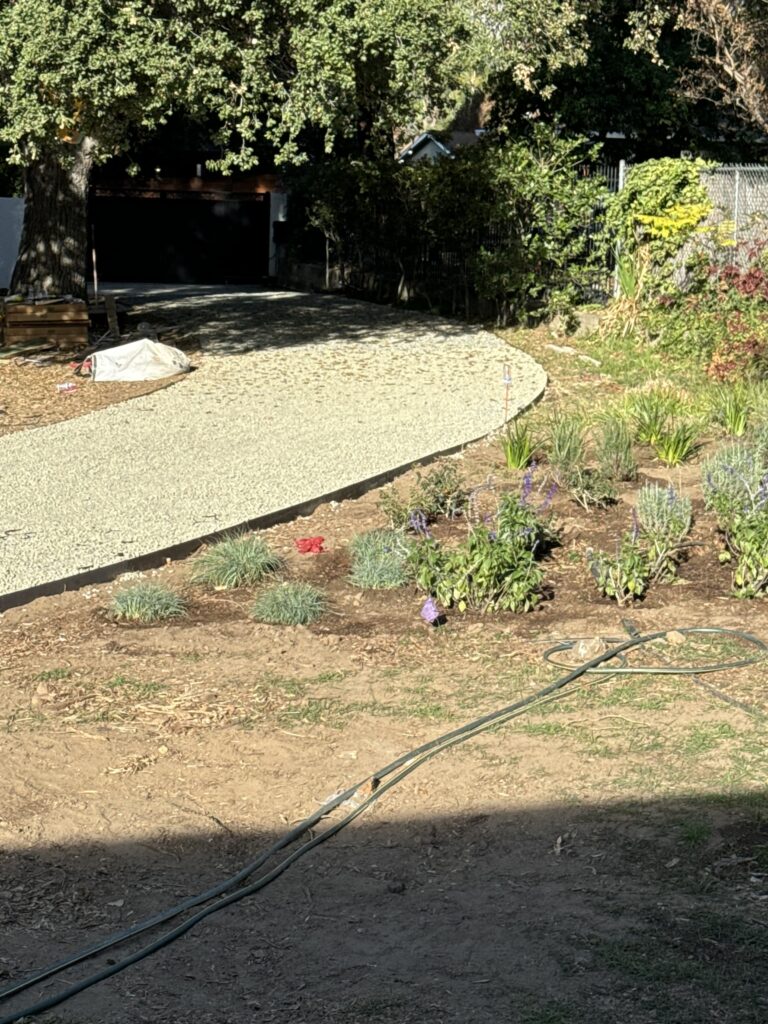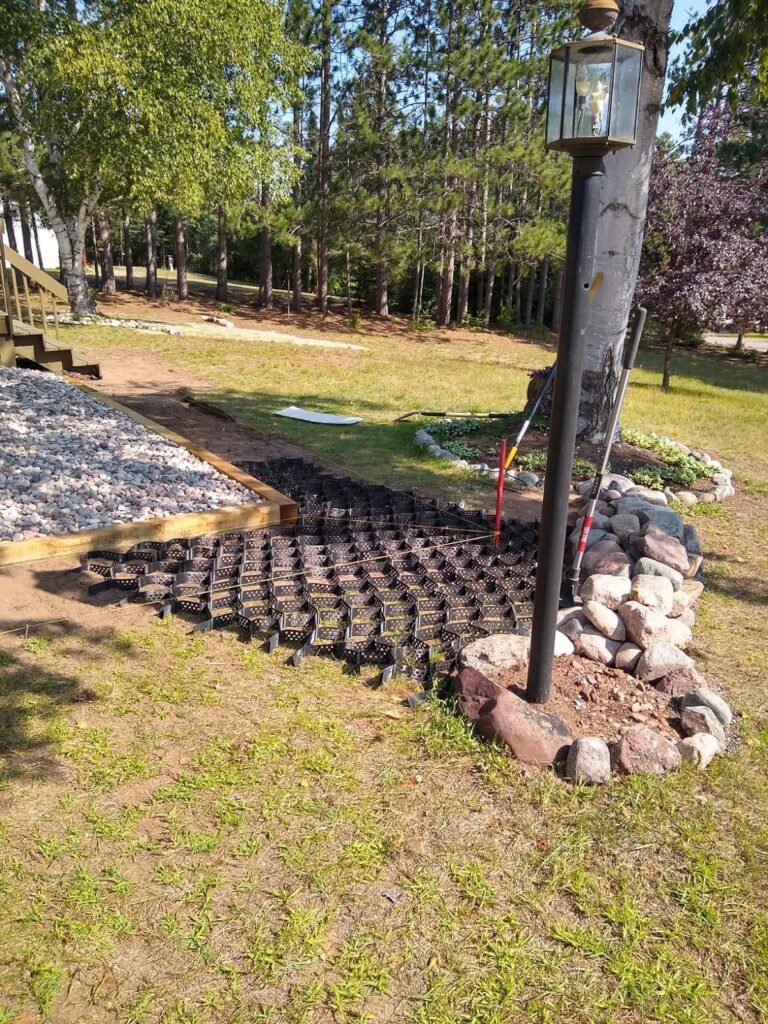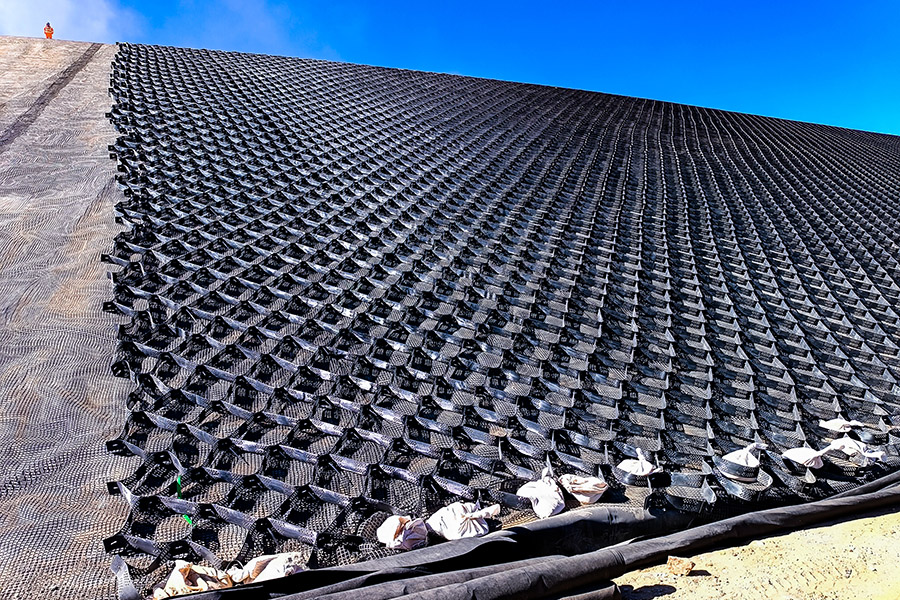Honest Vevor Geocell Review: How They Compare to BaseCore HD
If you’re researching geocells for your next driveway, patio, or garden path project, you’ve likely encountered both Vevor geocells and BaseCore HD options in your search. While Vevor has gained popularity as an affordable import option, many homeowners wonder how these geocells stack up against BaseCore alternatives.
This comprehensive Vevor geocell review compares these two leading options across critical performance factors, helping you make an informed decision for your next landscaping project.
The 3″ vs 6″ Debate: Why Height Isn’t Everything in Geocell Performance
One of the most significant differences between BaseCore HD and Vevor geocells is their approach to cell height. Vevor primarily promotes 6″ geocells for driveways and high-traffic areas, while BaseCore offers a 3″ HD model performs equivalently or better.
Our investigation reveals surprising facts about this key difference:
- Seam strength, not height, determines load capacity: BaseCore HD’s double-welded seams allow their 3″ cells to match or exceed the performance of Vevor’s 6″ cells
- Fill requirements differ dramatically: Using BaseCore 3″ HD instead of Vevor 6″ means 3″ less excavation and 3″ less aggregate needed
- Performance testing shows equivalent results: Under standardized load testing, BaseCore’s 3″ HD geocells demonstrated comparable or superior load distribution to Vevor’s 6″ displayed models
These findings challenge conventional wisdom about geocell height and suggest that construction quality and seam technology may be more important than cell depth alone.
Vevor Geocell Reviews: What Customers Are Saying About Seam Strength
When analyzing customer reviews of Vevor geocells across major retail platforms, a consistent pattern emerges regarding seam performance:
- Multiple reviewers mention concerns about Vevor’s ultrasonic welding holding up under heavy loads
- Several customers report needing to reinforce Vevor geocell connections for driveway applications
- Professional installers frequently note the difference in connection strength between Vevor and premium options like BaseCore HD
In contrast, BaseCore HD geocells utilize a military-derived double-welding process creating connections with tensile strength exceeding 2000 LBS/SQ FT. This technology results in significantly stronger bonds that maintain their integrity under pressure.
Explore our guide on understanding geocell seam technology for a deeper dive into this critical performance factor.
Material Quality Comparison: BaseCore HD vs Vevor Geocells
Beyond seam technology, material quality represents another significant difference between these geocell options:
The thicker HDPE material used in BaseCore HD geocells provides superior resistance to deformation under heavy loads, while their smaller cell design creates more reinforcement points for better weight distribution.
Learn more about material specifications in our geocell material guide.
Cost Analysis: Is BaseCore HD or Vevor More Economical Long-Term?
While Vevor geocells typically have a lower initial purchase price compared to BaseCore HD, our analysis reveals that the total project cost often favors BaseCore HD due to significant savings on aggregate materials:
For a standard 20’×24′ driveway:
- With Vevor 6″ geocells: Requires 6″ of aggregate fill
- With BaseCore 3″ HD: Requires only 3″ of aggregate fill
At average aggregate costs of $45-$55 per cubic yard, this 3″ reduction translates to savings of $200-$250 on a typical driveway project alone. When factoring in reduced excavation needs and lower disposal costs, many homeowners find that BaseCore HD delivers better overall value despite a potentially higher upfront cost.
The math is straightforward:
- 480 sq ft × 0.5 ft less depth = 240 cubic feet = 8.9 cubic yards
- 8.9 cubic yards × $45-$55 = $400-$490 in potential aggregate savings
- Typical savings after accounting for price differences: $200-$250
Warranty Comparison: Vevor vs BaseCore HD Geocells
The warranty protection offered by each manufacturer provides insight into their confidence in product longevity:
- BaseCore HD: 10-year comprehensive warranty covering material and workmanship defects
- Vevor Geocells: 12-month limited warranty
This striking warranty difference highlights fundamentally different approaches to product design and quality assurance. For homeowners making a significant investment in property improvement, BaseCore’s warranty offers substantially better long-term protection, particularly against critical seam failures.
Explore the full details of BaseCore’s industry-leading warranty coverage to understand the value of this long-term protection.
Company Headquarters and Support: A Critical Difference
The location of a company’s headquarters and design team significantly impacts product quality and customer experience. BaseCore is an Arizona-based company with design and engineering teams in the United States, while Vevor operates internationally with different support structures.
This company location difference creates several performance and support distinctions:
- Design optimization: BaseCore products are specifically engineered for US construction standards and local soil conditions
- Technical support: BaseCore offers direct access to engineers familiar with US building codes and regional requirements
- Customer service: BaseCore provides US-based support teams who understand local project needs
- Supply chain reliability: BaseCore maintains reliable distribution with consistent availability
BaseCore’s geocell technology evolved from systems originally developed by the US Army Corps of Engineers, bringing military-grade performance standards to residential applications.
Waste Reduction: Panel Size Comparison Between Vevor and BaseCore HD
An often-overlooked factor in geocell economics is how panel dimensions affect material waste on typical projects. Our calculations reveal significant differences:
For a standard driveway (20’×24′):
- BaseCore HD: 0% material waste. Our panels come 10×12 feet
- Vevor Geocells: 21.6% material waste
For a garden path (3’×30′):
- BaseCore HD: 0% material waste Our 2″ Walkway panels come 6 x 9 feet allowing the to eaily be cut in half thus making 3 foot widths.
- Vevor Geocells: 41.2% material waste
This expanded size optimization means BaseCore HD typically requires fewer panels to complete a project, reducing both waste and labor requirements.
Installation Support: Vevor vs BaseCore HD Customer Experience
Both companies market their products as DIY-friendly, but the level of installation support differs substantially:
- BaseCore HD: Offers free project consultations, engineering support, detailed installation guides, and US-based customer service
- Vevor: Provides basic installation instructions and limited technical support
Several Vevor geocell reviews mention challenges with their connection system. According to independent reviews on third-party sites like Landscaping Today and DIY Home Projects:
- “The plastic clips require significant force to connect properly”
- “Several clips broke during installation in hot weather”
- “The connection system was the most frustrating part of the installation”
In contrast, BaseCore HD’s innovative connection system receives consistently positive feedback, with reviewers noting:
- “Cells connected easily even in 90+ degree heat”
- “The panel design makes alignment intuitive”
- “Installation went much faster than expected”
For first-time installers, this difference in connection system reliability can significantly impact the overall project experience. Learn more about proper installation techniques in our geocell installation guide.
Real-World Project Examples of BaseCore
To better understand how these geocell options perform in actual applications, we examined several completed projects using each product type:
Example 1: Residential Driveway in Arizona
A 24′ × 20′ driveway installed with BaseCore 3″ HD geocells required only 3″ of aggregate fill and has maintained perfect structural integrity through two years of daily use including heavy RV parking.

Example 2: Garden Path with Heavy Foot Traffic
A winding garden path installed with BaseCore 3″ HD has maintained its original profile after three years of continuous use in a high-traffic area.

Expert Opinions: What Landscaping Professionals Say
Professional landscapers and engineers who have worked with both products consistently highlight several key differences:
According to Josh Williams, a professional landscaper featured in Yard & Garden Magazine: “The difference in seam strength between BaseCore HD and Vevor geocells is immediately apparent when installing. BaseCore’s double-welded seams create a significantly more rigid structure that distributes loads more effectively.”
Civil engineer Maria Rodriguez notes in her technical review for Construction Technology Quarterly: “Our testing reveals that BaseCore’s 3″ HD geocell achieves comparable load distribution to traditional 6″ cells through superior material engineering and connection technology.”
Making the Smart Choice for Your Next Project
When evaluating Vevor geocells against BaseCore for your next driveway, garden path, or patio project, our comprehensive review points to several key advantages of BaseCore HD:
- Superior economics: Save up to 40% on aggregate costs with 3″ vs 6″ cells
- Better connection technology: Double-welded seams outperform standard ultrasonic welding
- Longer warranty protection: 10 years vs 12 months
- US-based design and support: Access to sales engineers who understand local conditions
- Easier installation: Better connection systems and installation support
While Vevor geocells may offer a lower initial price point, BaseCore delivers superior long-term value through better performance, reduced aggregate requirements, and comprehensive warranty protection.
For DIY homeowners focused on long-term performance and value, BaseCore provides compelling advantages that typically outweigh the initial price difference when total project costs are considered. Explore our product specifications to learn more about BaseCore HD’s performance advantages or contact our engineering team for a personalized project consultation.
